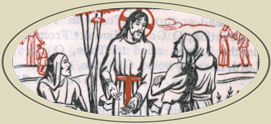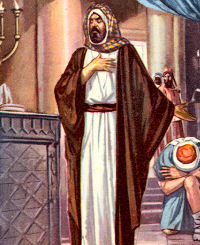Ordinary Time: October 24th
Thirtieth Sunday in Ordinary Time; World Mission Day
» Enjoy our Liturgical Seasons series of e-books!
Today is World Mission Day. Read the Message for World Mission Day 2021 by Pope Francis.
And they came to Jericho; and as he was leaving Jericho with his disciples and a great multitude, Bartimae'us, a blind beggar, the son of Timae'us, was sitting by the roadside. And when he heard that it was Jesus of Nazareth, he began to cry out and say, "Jesus, Son of David, have mercy on me!" (Mk 10:46-52).
The feast of St. Anthony Mary Claret, which is ordinarily celebrated today, is superseded by the Sunday liturgy.
Click here for commentary on the readings in the 1962 Roman Missal of St. John XXIII.
Sunday Readings
The First Reading, from the book of the Prophet Jeremiah, 31:7-9, "Behold I will bring them back from the land of the north; I will gather them from the ends of the world, with the blind and the lame in their midst, the mothers and those with child; they shall return as an immense throng." Today's reading talks about the restoration of Israel and the new exodus.
The Second Reading, from St. Paul's Letter to the Hebrews, 5:1-6, "You are a priest forever according to the order of Melchizedek." Paul develops the figure of Melchisedech as a type of Christ, the eternal High Priest of the New Covenant. Unlike the Levitical priests, Melchisedech is given no genealogy in Scripture. Paul sees in this fact the intention of the Holy Spirit to prefigure Christ's eternal priesthood.
We read in this Sunday's Gospel (Mark 10:46-52) that, while the Lord passes through the streets of Jericho, a blind man named Bartimaeus addresses him, crying out loudly: "Jesus, Son of David, have mercy on me!" This entreaty moves Christ's heart, who pauses, has him called and cures him.
The decisive moment was the personal, direct encounter between the Lord and that man who was suffering. They are before one another -- God with his will to cure and the man with his desire to be cured. Two liberties, two converging wills, "What do you want me to do for you?" the Lord asks him. "Let me receive my sight," replies the blind man. "Go your way; your faith has made you well."
With these words, the miracle is realized -- God's joy, man's joy. And Bartimaeus, who had recovered his sight — recounts the Gospel — "followed him on the way": That is, he becomes his disciple and goes up with the Master to Jerusalem to take part with him in the great mystery of salvation. In the essential of its passages, this account evokes the itinerary of the catechumen toward the sacrament of baptism, which in the early Church was also called "lllumination."
Faith is a path of illumination; it starts from the humility of acknowledging one's need of salvation and arrives at the personal encounter with Christ, who calls [one] to follow him on the way of love. On this model the itineraries of Christian initiation have been established in the Church, which prepare for the sacraments of baptism, confirmation and the Eucharist.
In places of past evangelization — where the baptism of children is widespread — catechetical and spiritual experiences are proposed to young people and adults which enable them to undertake a path of rediscovery of the faith in a mature and conscious way, in order to assume later a coherent commitment to witness. How important is the work that pastors and catechists carry out in this field!
The rediscovery of the value of one's baptism is the basis of the missionary commitment of every Christian, because we see in the Gospel that he who lets himself be fascinated by Christ cannot do without witnessing the joy of following in his footsteps. In this month of October, especially dedicated to the mission, we understand even more that, in virtue of baptism, we have an inherent missionary vocation.
We invoke the intercession of the Virgin Mary so that missionaries of the Gospel will multiply. Intimately united to the Lord, may every baptized person hear that he is called to proclaim the love of God to all, with the testimony of his own life.
--Angelus Address, Pope Benedict XVI, October 29, 2006
 Commentary on the Readings for the Twenty-Second Sunday after Pentecost
Commentary on the Readings for the Twenty-Second Sunday after Pentecost
"Render. . .to Caesar the things that are Caesar's, and to God the things that are God's (Gospel).
In today's Mass the Church bids us prepare "without offense unto the day of Christ," that is, the day of Final Judgment (Epistle). Hence St. Paul prays with us today that our "charity may. . .abound in . . .discernment."
Yes, "discernment!" lest we be deceived by the tricky questions of Pharisee friends and foes, or even the Pharisee spirit in our own conscience. Jesus gives the answer: "Render. . .to Caesar the things that are Caesar's" (symbolized by small figures at right), "and to God the things that are God's (symbolized by small figures at left).
On this Sunday, officials and citizens alike may well cry out "from the depths" (Introit) for forgiveness of their failure to prepare.
—Excerpted from My Sunday Missal, Confraternity of the Precious Blood






